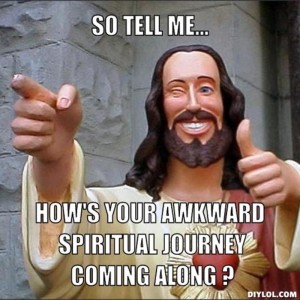 Let’s talk about spiritual embarrassment.
Let’s talk about spiritual embarrassment.
My parents were both baptized Catholic. My mother’s heritage was French-Canadian, and my father’s was a mix of Italian, German, and Polish. Both were raised in the Catholic faith with different outcomes: my father is an atheist, and my mother was a guilt-ridden Catholic all her life. I say guilt-ridden because although she never said it, I always had the sense she felt she wasn’t deserving of love from the divine. And like most Catholics raised in the middle of the century, she was taught that God was a strict man, one who exacted punishment for all transgressions, no matter how minor.
(Side note: For real though. Doesn’t Catholicism have the highest defector rate? I mean really. Most Catholics are no longer practicing and grimace when they think about it.)
At the age of ten, I decided God wasn’t a man. I was much more comfortable with the idea of God being a woman.
In college, I had a phase where it was easier to believe there was no God. It was almost comforting to “know” that we are all there is. But as comforting as it is intellectually not to have those open questions and loops, it’s also a lonely existence. I was also surrounded by people who found it easier to think the same. There was a cynical air about the whole thing, an accepted social belief that God didn’t exist and religion was for the weak and dogmatic.
It wasn’t until the end of a long relationship and a series of serendipitous coincidences that I found my way into a deeper study of yoga. In that string of serendipity, it was hard to believe that all of these incidents were just random. That there was no divine timing behind it. And as often happens with yoga, one can’t practice for a long period of time without undergoing some deep internal changes, whether you realize it (or want it) or not.
Then I went to South America. I started to hear about this thing called ayahuasca, and my curiosity was piqued. After a couple of months of travel, I finally found a place in Pisaq, Peru, and participated in my first ayahuasca ceremony.
I could go on about this for hours, but the point is this: for the first time in my life, I saw the interconnectedness of everything. It was like someone pulled the curtains back on reality as we know it and gave me a glimpse of what was beyond, and nothing was ever the same again. Since returning I’ve participated in a lot of different kinds of ceremonies, each one of them bringing me closer to the core of myself, helping me shed layers.
When I came back, I dug out the books I had in the back of the closet, the ones that were too embarrassingly spiritual to display out in the open. Tarot cards became a thing for me again.
But how to talk about these newfound beliefs? There’s a bit of a personal inconsistency here that feels uncomfortable for an analytical mind like mine. Add to that our culture’s skewed view on religion (which in my opinion is not the same as spirituality, but is often combined and confused), and it’s hard not to feel queasy discussing spiritual beliefs out in the open.
Although I was “coming out of the closet,” I wasn’t really sharing with anyone outside of my close friend group. In conversations about spirituality with anyone whose beliefs I was unsure of, I made sure to make a joke of whatever I was saying by referring to it as “woo woo.” Basically, I was making fun of myself before they could.
And then there’s the “woo” factor. I wasn’t even aware of this until I was in a circling session (read more about it here if you’re curious) with someone who facilitates for a living. We were introduced by a friend of mine who, shall we say, is a spiritual junkie, and easily spends thousands of dollars on healers and therapists a week. While his team seems like the best of the best, I’ve always wondered if they just tell him what he wants to hear.
We were talking about “playing nice” and the tendency to pretend one thing when we really feel another. I told her I had been playing nice with a lot of things in my life, and she said she wanted me to give it to her, to tell me what I really thought of what we were doing, as a way to practice. So I told her I thought she was “woo” and we laughed.
But then she said “There’s more there. What does that mean to you?”
As I felt into it, I realized that my association with it was two-fold: one, I wanted to believe (and truthfully, I have had amazing, wonderful experiences with healers). But the other side of me was thinking, “All of this is bullshit, people like you manipulate other people, and you’re just another part of someone’s ‘merry band of trumpeters’ who tells them what they want to hear.”
And I told her that. And it felt good to say, and also shocking to know what was behind my description of “woo” this entire time. The result of holding those conflicting beliefs? Spiritual shame.

Be First to Comment